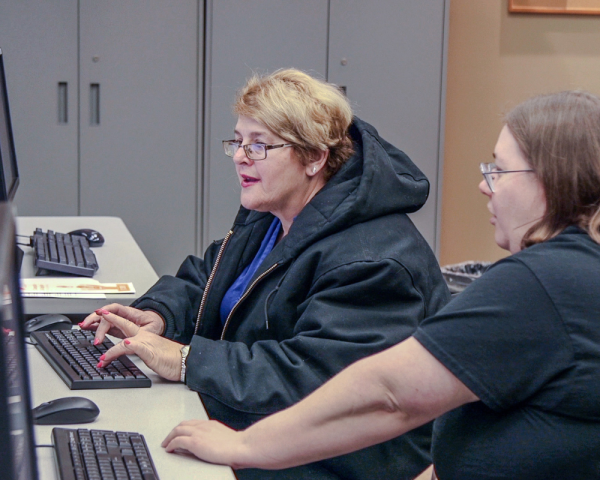

Collection Development Policy
Board of Trustees Statement
The Materials Selection Policy was initially adopted February 25, 1987 by the Lexington Public Library Board of Trustees and was revised March 24, 1993. The Materials Selection Policy was updated and renamed the Collection Development Policy which was approved by the Board on January 14, 2009. The Board of Trustees assumes full responsibility for all legal actions which may result from the implementation of any policies stated herein.
1. The Lexington Public Library
1.1: Vision
A community engaged in a lifetime of discovery.
1.2 Mission
Lexington Public Library connects people, inspires ideas, and transforms lives.
1.3 The Values
Excellence: We don’t just help you. We make your day better.
Equality: We treat you with fairness and respect.
Integrity: We work to earn your trust and honor our heritage.
Stewardship: We care for the library that you entrust to us.
Passion: We love Lexington, we love what we do, and want you to know it.
1.4 Customers
The Lexington Public Library serves the needs of the diverse population of Lexington-Fayette County, along with Fayette County workers, students and property owners who live outside the county.
1.5 Intellectual Freedom
The Board of Trustees of the Lexington Public Library has adopted and supports the following documents from the American Library Association: The Library Bill of Rights, Diversity in Collection Development, Access to Library Resources and Services to Minors, Expurgation of Library Resources, Labeling Systems, Rating Systems, Freedom to Read Statement, and the Freedom to View Statement (See Appendices A through G).
The Board of Trustees supports the Library’s dissemination of knowledge and information, and the presentation of a wide variety of ideas. The customers of the Lexington Public Library have the right to access diverse points of view. The Library does not try to justify any particular ideas; nor does it promote any particular points of view.
The Board of Trustees of the Lexington Public Library recognizes that censorship is an individual matter and while anyone is free to reject for themselves any material of which they do not approve, no one can exercise this personal right of censorship to restrict the freedom of others to read, view, or listen.
The selection of library materials is predicated on the library customer’s right to read and their freedom from censorship by others. Some materials are controversial and any given item may offend someone. Selections will not be made on the basis of any anticipated approval or disapproval. The merits of any material within the context of the established selection criteria will be the primary consideration (See Section 2.4).
Parents or legal guardians have sole responsibility for their child’s reading, viewing and listening of Library materials. Neither the Library nor Library staff shall act in loco parentis. Selection and/or shelving of materials will not be influenced by the possibility that materials might inadvertently come into the possession of minors.
2. System Collection Development- Organization
The Library will select materials that support life-long learning, popular materials, and materials that reflect the diversity of viewpoints and backgrounds of our service population.
The Collection Development Policy of the Lexington Public Library, as adopted by the Board of Trustees, provides guidance to the professional staff responsible for materials selection and collection development and serves as a source of information about selection principles for the general public.
“Materials” as discussed in this document may include, but are not limited to: books, magazines, newspapers, music, video, and other information in both physical and electronic formats.
The Board of Trustees of the Lexington Public Library endorses the Code of Ethics adopted by the American Library Association as it applies to materials selection and other duties (See Appendix H).
2.1 Collection Development Policy Statement
Collection Development is conducted through examination and consideration of review media, announcements of new publications by publishers, customer and staff recommendations, bibliographies on specific subjects, and examination of the present collection. Materials will be evaluated as a whole and not on the basis of a particular section or sections. A work will not be excluded from the Library’s collection because it presents an aspect of life honestly or because of frankness of expression. Materials are acquired in a manner that is both timely and useful to our customers.
The evaluation of materials will be characterized by flexibility, open-mindedness, and responsiveness to the changing needs of our customers. These changing needs require that materials be evaluated on a continuing basis. As a result, materials not recommended for purchase originally may be selected for purchase at a later date. The converse, that materials still may be considered unnecessary or irrelevant for the collection, also is possible.
Since the Lexington Public Library functions as a center for life-long learning, it has materials to support learning through all the ages and phases of life, from the youngest child’s needs to those of senior citizens.
A significant part of the Library’s collection is popular materials for recreational use. Popular materials may be in a variety of formats and either fiction or nonfiction. The Library’s selectors consider the popular materials collection seriously and select for a wide range of interests using evidence-based software and statistics, as well as reports from diversity audits.
Materials are purchased in the most appropriate, and available, format for library and customer use. New formats will be considered for the collection when industry reports, national survey results, and local requests indicate that a significant portion of the community has the necessary technology to make use of the new format. Other factors to be considered when deciding whether to add a new format to the collection include: availability of items in the format, cost per item, and the Library's ability to acquire, process, and circulate the items in the specific format.
Collection Development also entails maintaining the existing collection so that it remains vital and useful to the community. This includes the regular and consistent evaluation of the collection for withdrawal and replacement of worn out and dated materials using available tools and software.
2.2 Organization of Collection Development
The Executive Director is responsible for the selection, acquisition, and possible reconsideration of library materials. This authority is delegated to the Executive Director by the Board of Trustees which establishes the policies of the Library. The Executive Director delegates to the Deputy Director the authority to interpret and apply the appropriate policies and procedures in making day-to-day decisions regarding the collection. Responsibilities of the Deputy Director include, but are not limited to:
- Assigning the responsibility for the selection of specific materials to individual subject or format specialists;
- Ensuring that established criteria are properly applied to the selection of materials and resources (See Section 2.4);
- Ensuring that the best evaluative tools are available to the selectors;
- Ensuring that new subjects are included;
- Ensuring that the diversity of the collection is maintained;
- Reviewing the availability of materials in high demand and addressing gaps in the collection;
- Ensuring the collection is regularly weeded of out-dated, worn and un-used materials;
- Determining effective ways to analyze the use of the collection.
2.3 Goals of Collection Development
The Lexington Public Library selects, provides access to, and promotes the use of materials, regardless of format, that will:
- Enrich and support the educational, recreational, and informational needs of the users, taking into consideration their varied interests, abilities, and learning styles;
- Reflect the problems, aspirations, attitudes, and ideals of a pluralistic society;
- Support business, cultural, recreational, and civic activities in the community;
- Stimulate self-understanding and growth;
- Enhance job-related knowledge and skills;
- Increase knowledge of and participation in the affairs of the community, the country and the world;
- Be relevant to the level of the user.
2.4 Criteria for Collection Development
Every attempt is made to consider all acquisitions using the following criteria:
- Suitability of format for library use;
- Relevance of subject, style, and format for the intended age level;
- Present and potential relevance to the community interests and needs;
- Circulation history of author’s previous works or similar titles;
- Number and nature of requests from the public;
- Authors and/or topics of local origin;
- Current or historical significance;
- Importance as a document of the times;
- Insight into human and social conditions;
- Relationship to the existing library collections and to other materials on the subject which are available in those collections;
- Reputation and significance of the author, illustrator, publisher or producer;
- Skill, competence, and purpose of the author, illustrator, or producer;
- Attention of critics, reviewers, and the public through awards, media outlets and direct recommendations;
- Appropriateness and effectiveness of medium to content;
- Physical limitations of the building;
- Commercial availability of the material;
- Cost
The following criteria, in addition to the appropriate criteria listed above, should be used in consideration of acquiring and/or maintaining online databases or other virtual services:
- System priorities. A higher priority will be given to databases or services that will provide access to the widest group of customers;
- Usage;
- Cost per use;
- Viable alternatives to the database or service being considered;
- Breadth vs. depth of information provided by the database or service;
- Resources that are already offered in another format or service provided by the Library;
2.5 System Concept of Collection Development
The Lexington Public Library system is composed of multiple locations that house many interdependent departments and collections. These components work together to provide outstanding material collections. Within these locations, there are distinct characteristics that determine the type of collection development that will be most effective.
The chief function of all locations is to meet the popular and general needs of the customers within their respective service areas and appropriate to their size. All location collections are supported by the electronic resources provided by the Lexington Public Library. Locations offer materials with proven or anticipated demand, and their collections are developed based on the needs of their particular customers.
The Lexington Public Library’s courier service allows for timely resource-sharing among its locations. This enhances the Library’s ability to provide exceptional customer service to the entire community.
Books and magazine articles not owned by the Lexington Public Library can be requested through interlibrary loan (ILL). Interlibrary loan allows customers access to millions of titles owned by thousands of public, academic, and special libraries throughout the world. Delivery times can vary depending on the source of the material. Certain types of materials are not available through ILL. These include rare and valuable books, books published within the past year, and audiovisual materials (with the exception of titles owned by the Kentucky Department for Libraries and Archives (KDLA)). Interlibrary loan requests can be submitted online through the Library’s website, over the phone, or in person at any of the Library’s locations.
2.6 Customer and Staff Recommendations
The Lexington Public Library accepts recommendations from customers and staff regarding additions to the collection. These requests can be made online or in person. These requests will be reviewed by the appropriate selectors and evaluated based on the selection criteria. If the requested material meets the library’s needs and criteria, the item will be purchased as funding allows.
2.7 Material Submission
The Lexington Public Library accepts the submission of material for review with the understanding that the material may or may not be placed in the collection and that the material, if accepted, may be sold or discarded as the physical condition and usefulness may warrant. Such material may be added to the collection if it meets the Library’s criteria for selection, but due to the large amount of material under review, physical copies will not be returned after review. If you wish to enhance the Lexington Public Library and the services we provide to our community, please consider donating a monetary gift to the Lexington Public Library Foundation.
2.8 Reconsideration of Materials
The Lexington Public Library provides a wide variety of materials to meet the needs and interests of as many of our residents as possible. If a customer feels that an item was purchased in error and is not in accordance with the Collection Development Policy, they may request reconsideration of that item by following the Reconsideration of Materials Procedure. Customers requesting reconsideration of an item must reside in Fayette County and have a valid Lexington Public Library card. We will consider five items per year per customer, and each must be listed using a separate reconsideration form. In order to be considered, the customer must have read, viewed, or listened to the entire material.
The request will be reviewed by the Collection Services Manager and Collection Services staff, bearing in mind the Collection Development Policy, the Library’s mission and overall priorities, the Library Bill of Rights, and the American Library Association guidelines on intellectual freedom. The Deputy Director or the Collection Services Manager will respond within 30 days of receiving the formal request with a final decision on the reconsideration request. Staff will review any reconsidered item once per year.
2.9 Weeding the Library Collection
The goal of the Lexington Public Library is to provide timely and relevant library materials, resources and services in good condition for our customers’ use. No attempt is made to create a research collection except in the Kentucky Room. Weeding should entail the same care, thought, and judgment as materials selection. In weeding the collection, it is important to keep in mind the goals of the Library’s Collection Development Policy. In general, the Lexington Public Library will follow the weeding guidelines established by the CREW method (See Appendix O). A weeding and replacement schedule has been devised to ensure regular maintenance of the collection and to increase efficiency and effectiveness in the replacement and weeding of materials. The Library also makes use of evidence-based software to provide statistics on material usage that informs the decision-making process. Multiple copies of materials may be purchased to take care of permanent or temporary demands.
2.10 Policy Revision
This statement of policy will be reviewed annually. Suggestions for revisions will be submitted to the Executive Director for review. The Executive Director will then present the revisions to the Board of Trustees for adoption.
Approved by LPL Board of Trustees January 14, 2009, and updated August 10, 2011; May 9, 2012; April 10, 2013; October 14, 2015; June 8, 2016; August 8, 2018; February 12, 2020; and November 9, 2022.
Appendices
- Appendix A: Library Bill of Rights
- Appendix B: Diversity in Collection Development
- Appendix C: Access to Library Resources and Services for Minors
- Appendix D: Expurgation of Library Resources
- Appendix E: Labeling Systems and Rating Systems
- Appendix F: Freedom to Read Statement
- Appendix G: Freedom to View Statement
- Appendix H: Code of Ethics of the American Library Association
- Appendix I: Libraries: An American Value
- Appendix O: Weeding the Library's Collection Using the CREW Method










